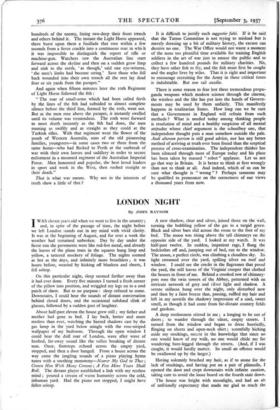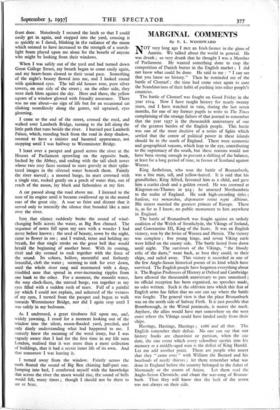LONDON NIGHT
By JOHN RAY NOR
IWAS eleven years old when we went to live in the country; and, in spite of the passage of time, the night before we left London stands out in my mind with vivid clarity. It was at the beginning of August, and for over a week the weather had remained unbroken. Day by day under the fierce sun the pavements were like red-hot metal, and already the leaves of the plane trees in the squares hung limp and yellow, a tattered mockery of foliage. The nights seemed as hot as the days, and infinitely more breathless ; it was hours before, wearied by kicking off blankets and sheets, I fell asleep.
On this particular night, sleep seemed farther away than it had ever done. Every five minutes I turned a fresh corner of the pillow into position, and wriggled my legs on to a cool patch of sheet. But to no purpose : sleep refused to come. Downstairs, I could hear the sounds of distant conversation behind closed doors, and the occasional subdued clink of glasses, followed by a sudden gust of laughter.
About half-past eleven the house grew still ; my father and mother had gone to bed. lay back, hotter and more restless than ever, watching the barred shadows cast by the gas lamp in the yard below mingle with the rose-striped wallpaper of my bedroom. Through the open window I could hear the dull roar of London, wave after wave of hushed, far-away sound like the sullen breaking of distant seas. Once, footsteps echoed across the empty yard, stopped, and then a door banged. From a house across the way came the jangling sounds of a piano playing hymn tunes with a soothing monotony—Nearer My God to Thee ; Crown Him With Many Crowns ; A Few More Years Shall Roll. The distant player established a link with my restless mind ; poured a stream of warm humanity across the cold, inhuman yard. Had the piano not stopped, I might have fallen asleep. A new shadow, clear and silver, joined those on the wall, turning the bubbling yellow of the gas to a turgid green. Black and silver bars slid across the room to the foot of my bed. The moon was rising above the tall chimneys on the opposite side of the yard. I looked at my watch. It was half-past twelve. In sudden, impatient rage, I flung the bedclothes off and, jumping out of bed, ran to the window. The moon, a perfect circle, was climbing a cloudless sky. Its light streamed over the yard, spilling silver on roof and window. I could see the cracks in the flagstones that paved the yard, the still leaves of the Virginia- creeper that clothed the houses in front of me. Behind a crooked row of chimney- pots rose the twin towers of the Abbey, patterned with an intricate network of grey and silver light and shadow. A serene stillness hung over the night, only disturbed now and then by a faint breeze that, passing, ruffled my hair and left in my nostrils the shadowy impression of a cool, sweet smell, as though it had come from far-distant country fields and gardens.
A deep restlessness stirred in me ; a longing to be out of doors ; to wander through the silent, empty streets. I turned from the window and began to dress hurriedly, flinging on shorts and open-neck shirt ; scornfully kicking aside my stockings, secure in the knowledge that since no one would know of my walk, no one would chide me for wandering bare-legged through the streets, (And, if I was caught, it would hardly matter. So small an offence would be swallowed up by the larger.) Having solemnly brushed my hair, as if to atone for the lack of stockings, and having put on a pair of plimsolls, I opened the door and crept downstairs with infinite caution, taking care to avoid the loose board on the fourth stair down.
The house was bright with moonlight, and had an air of unfriendly expectancy that made me glad to reach the front door. Noiselessly I secured the latch so that I could easily get in again, and stepped into the yard, crossing it as quickly as I dared, blinking in the radiance of the moon which seemed to have increased to the strength of a search- light beam played upon me alone for the benefit of anyone who might be looking from their windows. .
When I was safely out of the yard and had turned down Great College Street, my breath began to come easily again, and my heart-beats slowed to their usual pace. Something of the night's beauty flowed into me, and I looked round with quickened eyes. The tall old houses rose, pure silver towers, on one side of the street ; on the other side, they were dark blots against the sky. Here and there, the yellow square of a window glowed with friendly assurance. There was no one about—no sign of life but for an occasional cat slinking soundlessly along the gutter, tail upraised, eyes gleaming.
I came to the end of the street, crossed the road, and walked over Lambeth Bridge, turning to the left along the little path that runs beside the river. I hurried past Lambeth Palace, which, standing back from the road in deep shadow, seemed to • have a sinister and haunted appearance, not stopping until I was halfway to Westminster Bridge.
I leant over a parapet and gazed across the river at the Houses of Parliament sprawling on the opposite bank, backed by the Abbey, and ending with the tall clock tower whose two rosy faces seemed to stare gravely at their splin- tered images in the silvered water beneath them. Faintly the river moved ; a moored barge, its mast crowned with a single star, rocked gently on a patch of water that, out of reach of the moon, lay black and fathomless at my feet.
A car passed along the road above me. I listened to the note of its engine until it became swallowed up in the muted roar of the great city. A roar so faint and distant that it served only to intensify the silence that brooded like a mist over the river.
Into. that silence suddenly broke the sound of wind- changing bells across the water, as. Big Ben chimed. The sequence of notes fell upon my ears with a wonder I had never, before known ; the seed of beauty, sown by the night, came to flower in me ; and I waited, tense and holding my breath, for that single stroke on the great bell that would herald the beginning of another hour. With its coming, river and sky, seemed to rock together with the force of the sound. Its echoes, hollow, mournful and forlornly beautiful, cleft the water ; seeming to sink for ever down, until the whole river rang and murmured with a deep, troubled note that spread in ever-increasing ripples from one bank to the other. For a moment, the moonlit water, the rosy clock-faces, the starred barge, ran together as my eyes filled with a sudden rush of tears. Full of a painful joy which I could not explain, and ashamed of the wetness of my eyes, I turned from the parapet and began to walk towards Westminster Bridge, nor did I again stop until I was safely in my bedroom.
As I undressed, a great tiredness fell upon me, and, widely, yawning, I stood for a moment looking out of the window into the silent, moon-flooded yard, puzzled, and only dimly understanding what had happened to me. I scarcely knew the meaning of the word irony, but I was vaguely aware that I had for the first time in my life seen London, realised that it was more than a mere collection of buildings, that it had a secret inner life of its own. And that tomorrow I was leaving it.
I turned away from the window. Faintly across the roofs floated the sound of .Big Ben chiming hal&past one. Jumping into bed, I comforted myself with the knowledge that across the river the moon would rise, the* sound of bells would fall, many times ; • though I should not be there to see or hear. _











































 Previous page
Previous page